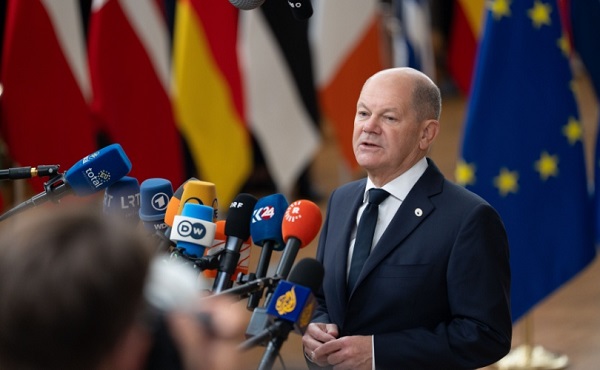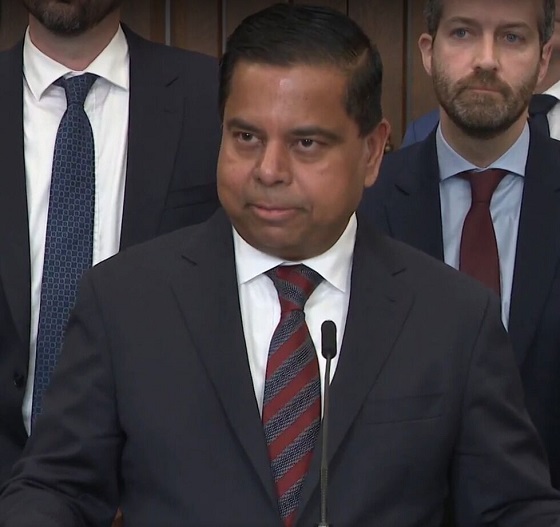International
German chancellor loses vote of confidence in parliament, likely triggering snap election

From LifeSiteNews
German President Frank-Walter Steinmeier is expected to set February 23 as the date for an election
German Chancellor Olaf Scholz has lost the vote of confidence in the Bundestag (German Parliament) after the breakdown of the government coalition.
On December 16, members of the Bundestag voted 394-207 against Scholz, with 116 abstentions. The vote of confidence was seen as a formality, and Scholz was expected to lose after the liberal FDP (Free Democratic Party) left the government coalition in early November.
As the German Tagesschau reported, Scholz met German President Frank-Walter Steinmeier at Bellevue Palace after the vote and asked him to dissolve the Bundestag.
Steinmeier has 21 days to decide whether he agrees and calls a snap election within 60 days. He is expected to do so and announce February 23 as the date. Had the coalition not dissolved, the next regular federal election would have taken place in September 2025.
Since the vote was only a formality, the parties used the debate in Parliament to campaign for the upcoming election. Scholz used his speech to launch an attack against the FDP. The “weeks of sabotage” by the Liberals under party leader Christian Lindner had not only damaged the coalition government but also democracy as a whole, he claimed.
CDU/CSU leader Friedrich Merz responded by defending the FDP and called the attack on Lindner “sheer insolence.”
Merz accused Scholz of leaving the country in one of the biggest economic crises in post-war history and failing at the EU level. “You are embarrassing Germany,” he stated. The Chancellor’s behavior in the European Union was “shameful,” Merz said.
Alice Weidel, co-head of the AfD (Alternative for Germany), slammed the left-wing government coalition, stating that its “damage” would burden Germany for decades to come. She pointed to the “decline” of the automotive and mechanical engineering industries and the exodus of the chemical industry due to “exploding energy costs.”
She viewed Donald Trump’s election as an opportunity to end the war in Ukraine through diplomacy while criticizing Scholz and Merz for making a “pilgrimage” to Kyiv to “throw even more good money after the money that has already been burned.”
Weidel warned that deploying German troops in Ukraine would risk Germany becoming a party to the war. She also stressed that “anyone who votes for Friedrich Merz is voting for war.”
The federal government will remain in office after losing the vote of confidence until the election of a new Parliament. However, the current coalition consisting of Scholz’s SPD (Social Democratic Party) and the Greens does not have the necessary majority and needs members of the opposition to vote alongside them if they want to pass any new laws.
Crime
Minnesota shooter arrested after 48-hour manhunt

 MxM News
MxM News
Quick Hit:
Vance Luther Boelter, accused of killing former Minnesota State House Speaker Melissa Hortman and her husband, was captured Sunday after leading law enforcement on a 48-hour manhunt.
Key Details:
-
Boelter allegedly began his rampage around 2 a.m. Saturday at Sen. Hoffman’s Champlin home, shooting both the senator and his wife, Yvette. The couple survived after emergency surgery.
-
He then traveled to Rep. Melissa Hortman’s Brooklyn Park home, where she was pronounced dead at the scene and her husband died shortly afterward at a hospital.
-
The suspect reportedly sent a farewell message to friends before fleeing and was later arrested in a Sibley County field Sunday night.
Sources provided this photo of Boelter from the scene after his arrest. pic.twitter.com/q4F9uPkm53
— Liz Collin (@lizcollin) June 16, 2025
Diving Deeper:
Vance Luther Boelter, the man accused of carrying out a targeted shooting of Democrat lawmakers in Minnesota, was taken into custody Sunday night following a 48-hour manhunt that spanned multiple counties. According to a report from Alpha News, Boelter was arrested in a field in rural Sibley County after evading police for more than a day following the deadly shootings.
Boelter, 57, previously served as an appointee under Gov. Tim Walz and is accused of murdering former Minnesota House Speaker Melissa Hortman and injuring State Senator John Hoffman and his wife, Yvette. Authorities say Boelter disguised himself as a police officer—complete with a uniform, ballistic vest, and Halloween mask—before launching the coordinated attacks early Saturday morning.
The violence began just after 2 a.m. when Boelter allegedly entered the Hoffman residence in Champlin and opened fire. Both the senator and his wife were struck multiple times. Their daughter, Hope, was reportedly shielded from the gunfire by her mother. The couple’s nephew confirmed that both John and Yvette Hoffman underwent surgery and were listed in stable condition by Sunday.
From there, Boelter allegedly drove to Brooklyn Park and carried out a second attack at the home of Speaker Emerita Hortman. The 55-year-old lawmaker was found dead inside the home, while her husband was transported to a hospital where he later succumbed to his injuries.
Brooklyn Park police officers, alerted by the earlier incident, arrived as Boelter was leaving the Hortman residence. A standoff ensued, with officers briefly cornering the suspect inside the house and opening fire, though Boelter managed to flee.
Boelter reportedly sent a chilling text message to close friends. “David and Ron, I love you guys. I made some choices, and you guys don’t know anything about this, but I’m going to be gone for a while,” he wrote. “May be dead shortly, so I just want to let you know I love you guys both and I wish it hadn’t gone this way.”
Energy
Could the G7 Summit in Alberta be a historic moment for Canadian energy?

From Resource Works
Canada can be the democratic world’s top energy supplier, and the G7 Summit in Alberta is the perfect time to commit to that.
Canada is at the crossroads of opportunity as the leaders of the G7 convene in Kananaskis, Alberta.
An Ipsos poll has named Canada the top preferred oil supplier among G7 countries for the second time since 2023. No less than 68 percent of G7 respondents declared that Canada was among their top three choices to supply oil.
This should be yet another motivator for Canada to solidify itself as a key player in energy security and economic stability among the democratic nations.
The timing and location of this year’s G7 summit shows how important Canada can be to the world. Alberta, Canada’s energy heartland, is the source of nearly all of the country’s oil, and the provincial government wants more of it to reach global markets.
Those geopolitical anxieties caused by Russia’s invasion of Ukraine in 2022 have not disappeared, and Canada’s allies and partners like the European Union (EU), Japan, South Korea, and India are looking for a reliable and responsible partner to supply them with energy, and we are the best and most obvious choice.
Willing partners are easy to find overseas, but the other provinces and the federal government need to become equally enthusiastic first.
There is more to this than mere symbolism. Canada embracing its position as the most desirable supplier of oil makes complete sense.
In 2023, Ipsos found that Canada’s political stability, comprehensive environmental rules, and strong regulatory frameworks are why it ranked first among preferred oil suppliers. Norway is another popular option, but Canada has the advantage of better market access to the United States and the Asia-Pacific, along with established infrastructure and an open government.
It all combines to create a distinct advantage for Canada in the world of trade.
The US has slid as a popular oil supplier, to Canada’s advantage, and we need to capitalize on that more than ever.
As Russia’s bloody, disruptive war with Ukraine continues to drag on, the EU still needs sources of alternative energy to make a clean break with Moscow. Russia had previously served as the bloc’s effective gas station, albeit one armed with nuclear weapons.
G7 member states like Britain and the EU are looking to slap even stricter limits on Russian energy exports that go beyond what is already in place. Whatever Russia has to lose is Canada’s to gain.
Canada began to enlarge its export capacity last year with the completion of the twinning of Trans Mountain pipeline (TMX), enabling Canada to double the amount of oil it can pipe to Pacific markets. Shipping larger amounts of Canadian energy to partners in Japan, India, South Korea, and others has never been easier.
It was a monumental example of how investing in the right sorts of infrastructure can improve economic security, both nationally and internationally. Internally, developing the oil industry is a long term goal of First Nations leaders and communities.
The myth of First Nations opposing the expansion of oil and gas is one that needs to die. The Indian Resource Council, which represents over 130 First Nations, has repeatedly championed the responsible development of natural resources as a means of fostering economic independence and community renewal.
Many First Nations and other Indigenous groups have invested heavily into pipelines, production sites and storage facilities, and want to expand it further. In terms of pure economic value, there is not another industry that has created more wealth in Indigenous communities across Western Canada.
Complacency from the federal government and other authorities at this time could not be timed more poorly as the G7 Summit comes to Alberta. When the gathering ends on June 17, we should hope that it was a turning point where Canada made a direct and clear commitment to modernizing and expanding its oil and gas sector.
Our role in the world can be that of the great democratic alternative to Russia when it comes to supplying energy and other resources. Alberta knows it, as do our allies and Indigenous people across Canada.
Ottawa should listen. It is time to realize our potential to be an even greater energy superpower.
Through that, we can reduce the power of authoritarian, hostile regimes in the world by building a stronger, more unified Canada.
-

 Business18 hours ago
Business18 hours agoCarney’s European pivot could quietly reshape Canada’s sovereignty
-

 Alberta17 hours ago
Alberta17 hours agoAlberta’s grand bargain with Canada includes a new pipeline to Prince Rupert
-

 Crime1 day ago
Crime1 day agoManhunt on for suspect in shooting deaths of Minnesota House speaker, husband
-

 Bruce Dowbiggin2 hours ago
Bruce Dowbiggin2 hours agoWOKE NBA Stars Seems Natural For CDN Advertisers. Why Won’t They Bite?
-

 Crime2 hours ago
Crime2 hours agoMinnesota shooter arrested after 48-hour manhunt
-

 Energy2 hours ago
Energy2 hours agoCould the G7 Summit in Alberta be a historic moment for Canadian energy?
-

 conflict3 hours ago
conflict3 hours ago“Evacuate”: Netanyahu Warns Tehran as Israel Expands Strikes on Iran’s Military Command



